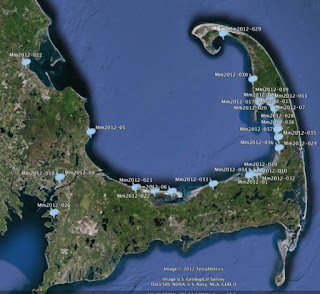Update on Ocean Sunfish Strandings for 2012
 |
| Ocean Sunfish Strandings for 2012. |
Hot off the Press!
Google Maps of Ocean Sunfish Strandings for 2012
With a little down time on my hands, I wanted to use Google Earth and plot the location of each of the 39 ocean sunfish that stranded dead this season. As you see, most stranded along the shores of Cape Cod, those that border Cape Cod Bay. But a few individuals stranded along the shores of Buzzards Bay and many of our live animals that we rescued were in this area.
The top map shows all strandings of dead animals for the 2012 season. To date, we were able to locate and examine 39 carcasses. Three additional carcasses were reported to NECWA, but we were not able to get to those carcasses before the tide washed them offshore. This is the highest number of stranded animals of any season to date and almost twice as many as last season. The bottom maps show close-ups of specific areas that turned out to be hot spots for strandings this season.
 |
| 2012 Ocean Sunfish Strandings, Barnstable and Dennis MA. |
Please remember that strandings of ocean sunfish are an annual event. Ocean sunfish migrate to our cold, productive waters to feed on jellyfish and other gelatinous critters. As winter approaches, they start to head south for warmer more tropical waters. Unfortunately, some animals become trapped by the physical presence of Cape Cod or they become trapped in back bay areas and inlets. This big fish can not tolerate cold water and will eventually become cold-stunned, typically washing ashore dead.
 |
| 2012 Ocean Sunfish Strandings, Brewster and Eastham MA. |
 |
| 2012 Ocean Sunfish Strandings, Wellfleet MA. |
We hope our ocean sunfish stranding season has ended, but only time will tell. Thank you again to all who assisted us with both live and dead strandings of ocean sunfish this season and seasons' past. Without your time and effort, we could not do this very important work. Thank you for caring!
A big thank you to the staff and volunteers at Mass Audubon
at Wellfleet Bay. Without their efforts, we would not have been able to locate
and necropsy many of the carcasses that stranded along the shores of Cape Cod.
Also a big thank you to Dr. John Jahoda and others at Bridgewater State University (BSU). BSU provides material and mental support : ) for this work and our other marine wildlife projects. Most of our ocean sunfish samples are stored at BSU and we are working with Biology student Lauren Tauer on aging studies related to this species.
Also a big thank you to Dr. John Jahoda and others at Bridgewater State University (BSU). BSU provides material and mental support : ) for this work and our other marine wildlife projects. Most of our ocean sunfish samples are stored at BSU and we are working with Biology student Lauren Tauer on aging studies related to this species.
The information obtained from these examinations is being
shared with researchers in the New England area and around the world. With your
help, we now have a better understanding of the biology and ecology of this
very unusual, but very deserving, marine fish in our New England waters.
Go Team Mola!
Best to all and a very Happy New Year!
Krill Carson
Marine Biologist and President
NECWA



Comments
Post a Comment